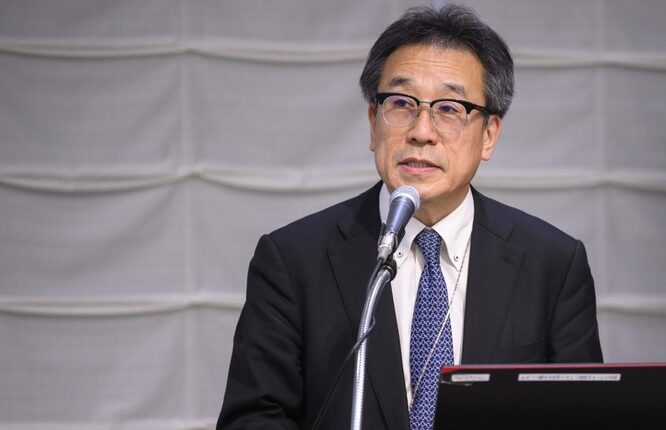India-Japan to Strengthen Green Partnership for Decarbonization and Economic Growth: MATSUZAWA Yutaka
MATSUZAWA Yutaka, Vice Minister for Global Environmental Affairs, Ministry of Environment, Japan today said that Japan-India are set to strengthen partnership through JCM Framework to accelerate decarbonization and green Investments.
New Delhi, India – MATSUZAWA Yutaka, Vice Minister for Global Environmental Affairs, Ministry of the Environment, Government of Japan (MOEJ), today while highlighting Japan’s goal of net-zero by 2050 and India’s 45 per cent emissions reduction target by 2030, stressed upon the natural partnership between Japan and India in decarbonization and economic growth.
Addressing the ‘India-Japan Environmental Business Promotion’, organized by the Ministry of Environment, Govt of Japan, jointly with FICCI, under the aegis of its Centre for Sustainability Leadership along with JCCII, IGES and OECC, Mr Yutaka said that global decarbonization requires international cooperation, particularly through public-private investments and crediting mechanisms. He acknowledged India’s strong potential in energy efficiency, green hydrogen, waste management, and biogas, reaffirming Japan’s commitment to supporting these initiatives.
The Vice Minister also underscored the need for technology transfer, financing, and strategic partnerships to accelerate sustainability efforts. He concluded by reinforcing Japan’s dedication to strengthening investment ties with India through the Joint Crediting Mechanism (JCM) framework, fostering energy security and a low-carbon future.
Milind Deore, Secretary, Bureau of Energy Efficiency, Ministry of Power, India, highlighted the long-standing India-Japan collaboration in energy efficiency, emphasizing key initiatives like the Perform, Achieve, and Trade (PAT) scheme, which has saved 25 million tons of oil equivalent energy, reduced 10 million tons of CO₂ emissions, and generated $10 billion in investments.
He stressed the need for a low-carbon technology pathway before achieving net-zero by 2070, with Japan’s advanced technologies playing a crucial role. He also mentioned India’s collaboration with Japanese institutions to develop energy efficiency guidelines for industries.
Additionally, Mr Deore announced that India’s domestic carbon market will be operational within six months, starting with compliance targets for key sectors, followed by an offset market. He concluded by reaffirming India’s commitment to energy efficiency and strengthening cooperation with Japan.
Manish Sharma, Chair, FICCI Resource Efficiency and Circular Economy Industry Coalition (RECEIC), Chair FICCI Electronics Manufacturing Committee, Chairman, Panasonic Life Solutions, India and South Asia, emphasized the critical role of responsible efficiency, conservation, and circular economy in driving sustainability. He highlighted the Resource Efficiency and Circular Economy Industry Coalition, formed during India’s G20 presidency, as an industry-led initiative to foster knowledge-sharing and policy action. He stressed that without strong public-private collaboration and a time-bound action plan, progress will be slow, especially in achieving energy security and transition.
IINO Satoru, Director, Office of International Carbon Market, Global Environment Bureau, Ministry of Environment, Government of Japan, shared Japan’s approach to carbon markets and its alignment with India’s sustainability goals. He emphasized that both nations share a strong commitment to climate action and, through innovative technologies and robust policy frameworks, can create mutually beneficial pathways toward decarbonization. He highlighted the potential of green ammonia, hydrogen, and solar energy in industrial transformation and stressed the importance of carbon dioxide removal technologies.
Rajani Ranjan Rashmi, Distinguished Fellow, The Energy and Resources Institute of India (TERI) & Former Special Secretary, Ministry of Environment, Forest and Climate Change (MOEFCC), and Former Chief Negotiator for Climate Negotiations, Government of India, said that India and Japan share a strong partnership in low-carbon development, focusing on emissions reduction, clean energy, and investments. He emphasized that India, the third-largest emitter, aims for 50 per cent of renewable energy by 2030 and net-zero by 2070.
Dr Rambabu Paravastu, Co-Chair, FICCI Environment & Climate Change Committee & Chief Sustainability Officer, Greenko Group emphasized India’s commitment to net-zero by 2070 and the critical role of deep decarbonization technologies in achieving this goal. He highlighted India’s low-cost solar power, expanding energy storage infrastructure, and green hydrogen potential, urging Japan to prioritize India for green ammonia production and export.
Bringing together a diverse group of policymakers, industry leaders, and sustainability experts from both India and Japan, the seminar served as a dynamic forum for knowledge exchange and collaboration. Key discussions revolved around advancing low-carbon technologies, with a focus on carbon market mechanisms, green hydrogen, energy efficiency, and waste-to-energy solutions—critical components in India’s path toward its Net Zero 2070 vision.


